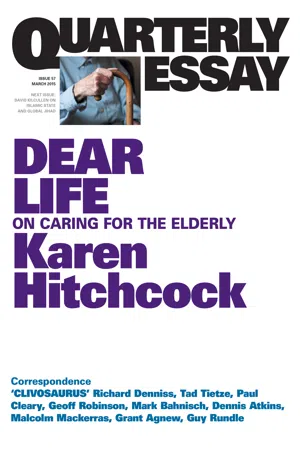
- 120 pages
- English
- ePUB (mobile friendly)
- Available on iOS & Android
About this book
In this moving and controversial Quarterly Essay, doctor and writer Karen Hitchcock investigates the treatment of the elderly and dying through some unforgettable cases. With honesty and deep experience, she looks at end-of-life decisions, frailty and dementia, over-treatment and escalating costs.Ours is a society in which ageism, often disguised, threatens to turn the elderly into a "burden" – difficult, hopeless, expensive and homogenous. While we rightly seek to curb treatment when it is futile, harmful or against a patient's wishes, this can sometimes lead to limits on care that suit the system rather than the person. Doctors may declare a situation hopeless when it may not be so.We must plan for a future when more of us will be old, Hitchcock argues, with the aim of making that time better, not shorter. And we must change our institutions and society to meet the needs of an ageing population. Dear Life is a landmark essay by one of Australia's most powerful writers.'The elderly, the frail are our society. They are our parents and grandparents, our carers and neighbours, and they are every one of us in the not-too-distant future … They are not a growing cost to be managed or a burden to be shifted or a horror to be hidden away, but people whose needs require us to change …' —Karen Hitchcock, Dear Life 'In Dear Life, Hitchcock has laid out her most important work to date in the type of clear, rational, respectful prose that the topic demands. As much as our natural instinct may be to avert our gaze from death, to push it from our minds at every opportunity, this essay is inspirational and aspirational in its scope. It is highly recommended to all those who hold life dear, and especially to those whose professional lives are devoted to helping us through illness and death with dignity.' —Weekend Australian 'Hitchcock's essay is not comfortable reading, but it is compelling' —Saturday Paper 'One of the most compelling and powerful ever published in the Quarterly Essay series' —Sydney Morning Herald 'A sensitive, rigorous, and moving account that exposes the prevailing ageism in our medical services and in Australian society as a whole.' —Australian Book Review Karen Hitchcock is the author of Quarterly Essay 57 Dear Life: On caring for the elderly, the award-winning story collection Little White Slips and a regular contributor to the Monthly. She is also a staff physician in acute and general medicine at the Alfred Hospital, Melbourne.
Frequently asked questions
- Essential is ideal for learners and professionals who enjoy exploring a wide range of subjects. Access the Essential Library with 800,000+ trusted titles and best-sellers across business, personal growth, and the humanities. Includes unlimited reading time and Standard Read Aloud voice.
- Complete: Perfect for advanced learners and researchers needing full, unrestricted access. Unlock 1.4M+ books across hundreds of subjects, including academic and specialized titles. The Complete Plan also includes advanced features like Premium Read Aloud and Research Assistant.
Please note we cannot support devices running on iOS 13 and Android 7 or earlier. Learn more about using the app.
Information
SOURCES
Table of contents
- Front cover
- QUARTERLY ESSAY 57
- Contents
- Dear Life
- Old and Sick
- Fragments
- Hospital Is No Place for the Elderly
- BestLaid Plans
- Separate and Solitary
- Death
- We, The Living
- Sources
- Clivosaurus: Correspondence
- Tad Tietze
- Paul Cleary
- Geoff Robinson
- Mark Bahnisch
- Dennis Atkins
- Malcolm Mackerras
- Grant Agnew
- Response to Correspondence: Guy Rundle
- Contributors
- Copyright
- Subscribe